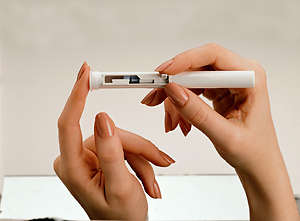
 |
|
 Diabetes Mellitus is defined as the body's inability to properly convert sugar from food into energy. Signs and symptoms include:
There are 4 different types of Diabetes: Type I Sometimes referred to as "insulin-dependent diabetes mellitus" or "IDDM" for short. This form of diabetes is the most serious. Onset of this disease usually develops during childhood, but young adults are susceptible as well. At this level of disease, the body stops making insulin or only produces very small amounts. Insulin is what the body needs in order to use food for energy. Since the body needs insulin in order to survive and control blood levels of sugar, those afflicted must inject insulin. Type II Called "non-insulin dependent mellitus" or NIDDM. This form of diabetes usually afflicts adults past 40 years of age but can occur at any age. With Type II diabetes, the body does not produce enough insulin or cannot utilize the insulin it produces. Due to this, high blood levels of sugar can cause problems. Type II diabetes can be inherited, but usually to bring on the disease, another factor such as obesity must be present. This form of the disease usually affects overweight adults and conditions may be improved by weight loss and proper evaluated meal planning. Type III This is gestational diabetes. It occurs in some women during pregnancy and usually disappears after childbirth. Patients diagnosed are then reclassified after delivery. Many of these women may later develop Type II diabetes. Type IV This includes other types of diabetes associated with genetic defects, pancreatic disease, hormonal abnormalities or side effects of drugs. What you can do if afflicted with diabetes:
|
|
Office Hours: Mon-Thurs 8 a.m. - 8 p.m. Friday 8 a.m. - 4 p.m. Saturday 8 a.m. - 2 p.m. |